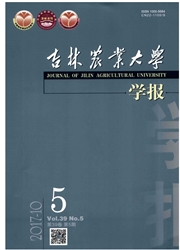

 中文摘要:
中文摘要:
为研究白杨素对金黄色葡萄球菌的抗菌活性以及该化合物对金黄色葡萄球菌肠毒素SEA和SEB表达的影响,应用肉汤微量稀释法检测了白杨素对金黄色葡萄球菌的最小抑菌浓度,采用TNF-α释放试验、蛋白免疫试验以及荧光定量PCR等方法分别从蛋白表型、蛋白水平和基因水平3个层面上考察了白杨素对金黄色葡萄球菌肠毒素SEA和SEB分泌的影响。结果表明:白杨素几乎无抗金黄色葡萄球菌活性,其MIC〉1 024μg/m L。低浓度白杨素(2-16μg/m L)即可抑制金黄色葡萄球菌肠毒素SEA和SEB的分泌,且这一抑制作用呈现剂量依赖性。
 英文摘要:
英文摘要:
In the present study,the authors aim to determine anti-bacterial activity of chrysin against Staphylococcus aureus and effects of chrysin on expression of enterotoxins by S. aureus. A broth micro-dilution method was employed to assay the minimal inhibitory concentrations( MICs) of chrysin against S. aureus. TNF-α release assay,western blot assay and RT-PCR assay were further employed to evaluate effects of chrysin on enterotoxins production. The results indicated that chrysin hardly has any anti-S. aureus activity( the MIC was larger than 1 024 μg / m L),however,lower concentrations of chrysin( from 2 to 16 μg / m L) could significantly reduce the production of enterotoxins by S. aureus in a dose-dependent manner.
 同期刊论文项目
同期刊论文项目
 同项目期刊论文
同项目期刊论文
 期刊信息
期刊信息
